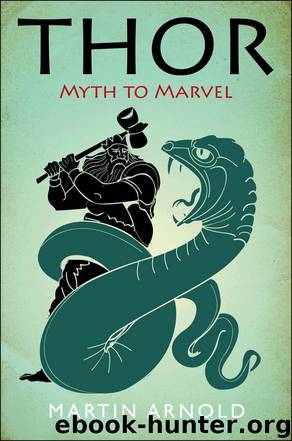Thor: Myth to Marvel by Martin Arnold

Author:Martin Arnold [Arnold, Martin]
Language: eng
Format: epub
ISBN: 9781441108579
Publisher: Bloomsbury Publishing
Published: 2011-06-02T07:00:00+00:00
Thor and Danish National Romanticism
Klopstock and Oehlenschläger could never have met, although Oehlenschläger’s mother reported to her son that Klopstock’s personality was too ‘exaggerated in style’ for her taste.35 Not that this diminished Oehlenschläger’s admiration for the man and the service he had done to Danish letters in giving direction to Ewald.36 Perhaps not surprisingly, the pan-Germanic literary nationalism espoused by Klopstock, Gerstenberg and succeeding generations of German intellectuals had not taken root in Scandinavia. Romantic sensibilities and the Napoleonic wars sharpened and localized nationalist movements, so that separate Scandinavian nations eagerly looked forward to reclaiming their national identities, purifying their languages of the contamination that had resulted from the political domination of neighbours, and asserting their right to independence. For the kingdom of Denmark, this meant that Norway slipped away from its control. The Danish monarchy was further undermined when, during the Napoleonic wars, its membership of the Armed Neutrality of the North brought the country into conflict with Britain in 1801 and 1807, when, in this last instance, Copenhagen was bombarded by the British Royal Navy. Forced to seek protection from France, Denmark was harnessed to Napoleon’s fate, which led, eventually, to bankruptcy and a further weakening of monarchic absolutism. Among the educated, a new liberalism opposed to state authoritarianism and fired with enthusiasm for a specifically Scandinavian cultural identity was gaining ground. It was in this political climate that Oehlenschläger began to hone his considerable poetic talent.
If Ewald had set the stage for Oehlenschläger, it was German-inspired Romanticism that directed the performance. In 1802, the philosopher and scientist Henrik Steffens (1773–1845) returned to Copenhagen after four years in Germany, where he had studied under Friedrich von Schelling (1775–1854) at the University of Jena, the leading figure in German Romantic philosophy; and, in his subsequent two-year stay at the University of Freiburg, Steffens had been profoundly influenced by Friedrich Werner (1768–1823), a disciple of Rousseau.37 During the course of 1802, Steffens gave nine lectures at Copenhagen’s Valkendorffs Kollegium. Attending them all was Oehlenschläger, and it is reported that Steffens personally instilled in him the key principles of German Romanticism in a single conversation lasting 16 hours.38 A deep reverence for the sublimity of nature and passionate nationalism combined in Oehlenschläger as they had in no other, and in his long-held enthusiasm for Nordic myth and history he found the perfect arena in which to articulate his ideas. For Oehlenschläger this was a specifically Scandinavian, at times specifically Danish, enterprise and it was to Anders Sørensen Vedel’s late sixteenth-century translations of Saxo Grammaticus that he turned, where he could study, absorb and revive native Danish expressions long since fallen into disuse.39
Oehlenschläger’s first collection of poetry was composed in a state of ecstasy during the same year that he attended Steffens’ lectures. Among the collection was the epoch-making ‘Guldhornene’ (The Golden Horns), published in Digte (1803), considered to be the manifesto of Danish National Romanticism. The subject of the poem is two elaborately decorated fifth-century golden drinking horns discovered in
Download
This site does not store any files on its server. We only index and link to content provided by other sites. Please contact the content providers to delete copyright contents if any and email us, we'll remove relevant links or contents immediately.
The Vikings: Conquering England, France, and Ireland by Wernick Robert(79178)
Ali Pasha, Lion of Ioannina by Eugenia Russell & Eugenia Russell(39931)
The Vikings: Discoverers of a New World by Wernick Robert(36828)
The Conquerors (The Winning of America Series Book 3) by Eckert Allan W(36705)
Cecilia; Or, Memoirs of an Heiress — Volume 1 by Fanny Burney(32078)
Cecilia; Or, Memoirs of an Heiress — Volume 3 by Fanny Burney(31470)
Cecilia; Or, Memoirs of an Heiress — Volume 2 by Fanny Burney(31420)
Empire of the Sikhs by Patwant Singh(22775)
Hans Sturm: A Soldier's Odyssey on the Eastern Front by Gordon Williamson(18334)
The Secret History by Donna Tartt(18224)
Cat's cradle by Kurt Vonnegut(14783)
Sapiens: A Brief History of Humankind by Yuval Noah Harari(13999)
Pimp by Iceberg Slim(13803)
Talking to Strangers by Malcolm Gladwell(12891)
Norse Mythology by Gaiman Neil(12863)
Leonardo da Vinci by Walter Isaacson(12815)
Underground: A Human History of the Worlds Beneath Our Feet by Will Hunt(11846)
4 3 2 1: A Novel by Paul Auster(11817)
The Radium Girls by Kate Moore(11639)
